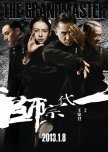Esta resenha pode conter spoilers
A battle you won't soon forget.
The opening film at the Berlin International Film Festival took a full 9 years to complete. Veteran perfectionist Wong Kar Wai is putting in the finishing touches, spending so much time on In the Mood for Love that the staff behind the Cannes festival worried that the film would not be able to enter the competition where it was scheduled to have its world premiere in 2000.
The year is 1936 in southern China. Gong Baosen (Wang Qingxiang) has passed his glory days and is about to retire. It is celebrated according to tradition at the Gold Pavillion brothel where Baosen challenges a younger man with the potential to take over the title of kung fu master. Ip Man (Tony Leung Chiu Wai) - Who in real life tutored Bruce Lee and trained in Wing Chun - Accepts the ordeal and takes over as the film's centerpiece.
War breaks out in Foshan between China and Japan and in the meantime Gong Baosen is murdered by his disciple Man San. Before leaving Earth, he wishes his daughter, Gong Er (Ziyi Zhang), to renounce a life in the world of martial arts, live in peace with a man by her side and not seek revenge. But can she resist the temptation with her father's fighting spirit in her blood?
The Grandmaster is told as a memoir with an eye on the past where the fourth wall is broken, jumping between romances and civil wars. The film spins on for two decades with clanging swords, pattering rain and kicks left and right. Sound, special effects and saturated lighting work together to form a kaleidoscope. Clouds of smoke and the sound of lovely strings in the background are earlier characteristics that can of course also be found in this work.
One could go on forever about the precise technical skills that make one drool with fascination. There is no doubt that the material has been handled with precision and the stylistic beauty is both a credit to the direction and script by Wong Kar Wai, as well as the impeccable work of cinematographer Philippe Le Sourd and William Chang Suk Ping who edited all of Wong's films. The camera records every little detail and every frame is a photograph or a painting.
The product is a film that, due to its dedicated cast, probably offers the most sensational and beautiful fight sequences ever seen. It provides a crash course in martial arts etiquette, different styles and holds, as well as the history of the Chinese nation with conflicts between the south and the north.
The year is 1936 in southern China. Gong Baosen (Wang Qingxiang) has passed his glory days and is about to retire. It is celebrated according to tradition at the Gold Pavillion brothel where Baosen challenges a younger man with the potential to take over the title of kung fu master. Ip Man (Tony Leung Chiu Wai) - Who in real life tutored Bruce Lee and trained in Wing Chun - Accepts the ordeal and takes over as the film's centerpiece.
War breaks out in Foshan between China and Japan and in the meantime Gong Baosen is murdered by his disciple Man San. Before leaving Earth, he wishes his daughter, Gong Er (Ziyi Zhang), to renounce a life in the world of martial arts, live in peace with a man by her side and not seek revenge. But can she resist the temptation with her father's fighting spirit in her blood?
The Grandmaster is told as a memoir with an eye on the past where the fourth wall is broken, jumping between romances and civil wars. The film spins on for two decades with clanging swords, pattering rain and kicks left and right. Sound, special effects and saturated lighting work together to form a kaleidoscope. Clouds of smoke and the sound of lovely strings in the background are earlier characteristics that can of course also be found in this work.
One could go on forever about the precise technical skills that make one drool with fascination. There is no doubt that the material has been handled with precision and the stylistic beauty is both a credit to the direction and script by Wong Kar Wai, as well as the impeccable work of cinematographer Philippe Le Sourd and William Chang Suk Ping who edited all of Wong's films. The camera records every little detail and every frame is a photograph or a painting.
The product is a film that, due to its dedicated cast, probably offers the most sensational and beautiful fight sequences ever seen. It provides a crash course in martial arts etiquette, different styles and holds, as well as the history of the Chinese nation with conflicts between the south and the north.
Esta resenha foi útil para você?

























